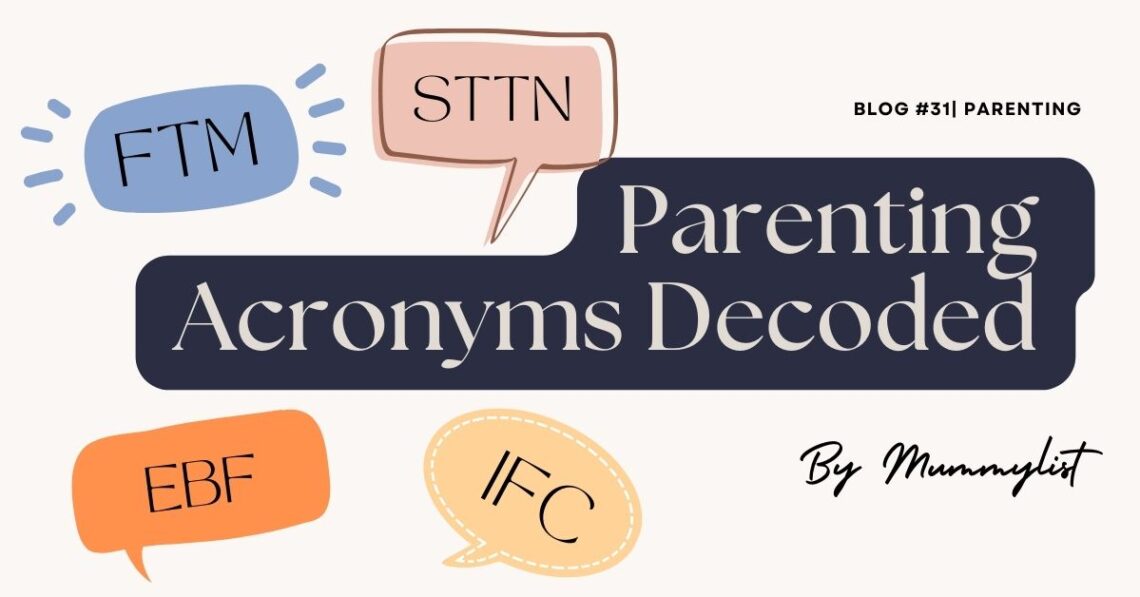The content on our parenting website is provided for informational purposes only. It is not a substitute for professional advice and should not be construed as such. We strive to provide accurate and up-to-date information, but the ever-evolving nature of parenting and healthcare may necessitate changes. By using our website, you agree to the terms of this disclaimer. For more details please go to our Disclaimer Page.
Feeling a bit overwhelmed by all the mummy acronyms and parenting terms floating around in Singaporean muommy circles & forums? Know that you are not alone! As a first-time mum (FTM) navigating the world of parenthood, understanding the shorthand language used by seasoned mums can feel like learning a whole new language. But fear not! In this crash course, we’ll decode the most common SG mummy acronyms, helping you transition from FTM to Pro Mum in no time.
Let’s dive in!
Pregnancy Related Mummy Acronyms & Terms:
- TTC: Trying To Conceive – When a couple is actively trying to become pregnant.
- HPT: Home Pregnancy Test – A test conducted at home to detect pregnancy.
- BFP: Big Fat Positive – A positive result on a pregnancy test.
- BFN: Big Fat Negative – A negative result on a pregnancy test.
- TTCAL: Trying to Conceive After Loss – When a couple is trying to conceive again after experiencing a miscarriage or stillbirth.
- EDD: Estimated Due Date – The expected date of delivery.
- GD: Gestational Diabetes – Diabetes that develops during pregnancy.
- HG: Hyperemesis Gravidarum – Severe and persistent nausea and vomiting during pregnancy.
- MFM: Maternal-Fetal Medicine – A specialty focusing on the management of high-risk pregnancies.
- IUGR: Intrauterine Growth Restriction – Condition where a baby doesn’t grow at the expected rate inside the womb.
- MC: Missed Miscarriage – A miscarriage where the fetus has died, but the body has not expelled it yet.
General Motherhood Mummy Acronyms & Terms:
- FTM: First-Time Mum – A woman who is experiencing motherhood for the first time.
- STM/TTM: Second-Time Mum/Third-Time Mum (and so on) – Refers to mothers who have already given birth to one or more children.
- SAHM: Stay-at-Home Mum – A mother who stays at home to take care of her children.
- SAHD: Stay-at-home dad – A father who stays at home to take care of his children.
- WOHM: Work-from-Home Mum – A mother who works from home while taking care of her children.
- FTWM: Full Time Working Mum – A mother who works full-time outside the home.
- FF: Formula Fed – A baby who is fed formula milk rather than breast milk.
- EBF: Exclusively Breastfed – A baby who is fed only breast milk and no formula.
- EP: Exclusively Pumping (breast milk) – A mother who feeds her baby only breast milk expressed through pumping.
- BM: Breast Milk – Milk produced by a mother’s breasts for feeding her baby.
- FM: Formula milk – Commercially prepared milk substitute for feeding babies.
- PP: Power Pumping -A technique used by breastfeeding mothers to help increase milk supply.
- LC: Lactation Consultant – A specialist who provides support and advice on breastfeeding. (Read more about our latest article: XXX)
- IBLC: International Board Certified Lactation Consultant – Healthcare professionals who specialize in lactation and breastfeeding support and have passed a certification exam administered by the International Board of Lactation Consultant Examiners (IBLCE)
- LO: Little One (refers to baby) – A term of endearment for a baby.
- DH: Dear Husband – Affectionate term for a wife’s husband.
- SO: Significant Other – Partner in a romantic relationship.
- BRC: Baby-Related Chat – Conversations or forums about topics related to babies.
Healthcare Mummy Acronyms & Terms:
- L&D: Labor and Delivery – The process of childbirth.
- NICU: Neonatal Intensive Care Unit – Specialized medical care for premature or ill newborn babies.
- NICU Grad: Baby who has been discharged from the Neonatal Intensive Care Unit.
- PD: Paediatrician – A doctor who specializes in the care of children.
- MW: Midwife – A trained health professional who helps with childbirth and provides prenatal and postnatal care.
- GP: General Practitioner – A doctor who provides primary care.
- PPD: Postpartum Depression – Depression experienced by some women after giving birth. (Read up more about Postpartum Depression resources available in Singapore!)
- PPA: Postpartum Anxiety – Anxiety experienced by some women after giving birth.
- OBGYN: Obstetrician-Gynecologist – A doctor who specializes in women’s reproductive health.
- VBAC: Vaginal Birth After Cesarean – A vaginal delivery after a previous cesarean section.
- VAX: Vaccination – The administration of a vaccine to stimulate the immune system to develop immunity to a disease.
- BCG: Bacille Calmette-Guérin (a vaccine against tuberculosis)
- MMR: Measles, Mumps, and Rubella (vaccine)
- GDD: Global Developmental Delay – A condition where a child does not meet developmental milestones at the expected time.
Baby Care Mummy Acronyms & Terms:
- CN/CL: Confinement Nanny or Lady – A caregiver who provides support and assistance to a mother and her newborn during the postpartum period. (Read up more about my PEM Confinement Nanny Review!)
- LATCH: Latch, Audible swallow, Tongue Tie check, Comfortable hold (for breastfeeding) – A method to ensure proper breastfeeding technique.
- SIDS: Sudden Infant Death Syndrome – The unexplained death of a seemingly healthy baby during sleep.
- CIO: Cry It Out (Sleep training Method) – A sleep training method that involves allowing a baby to cry for short periods before falling asleep.
- STTN: Sleep through the night – A baby who sleeps for an extended period without waking up. (Read up more about sleep essentials & strategies that helped my 4 month old STTN )
- BLW: Baby-Led Weaning – A method of introducing solid foods to babies by allowing them to feed themselves.
- CD: Cloth Diaper – A reusable diaper made of cloth.
- PNP: Pack and Play – A portable crib/playpen for babies.
- PT: Potty training – The process of teaching a child to use the toilet.
- PL: Parental Leave / Paternity Leave
- ML: Maternity Leave
Schooling Related Mummy Acronyms & Terms:
- IFC: Infant Care – Childcare specifically for infants (Usually around 2 to 18 months old)
- PG: Playgroup – Informal group for young children to play and socialize. (Usually 18 months to 3 years old)
- CC: Child Care – Formal childcare for children (Usually up to 6 years old)
- PCF: PA Childcare (a network of childcare centers subsidized by the PAP) – A network of subsidized childcare centers in Singapore.
Other Related Parenting Terminology:
- Colic: Frequent crying in babies (with no identifiable cause)
- Cluster Feeding: A period of frequent and closely spaced feeding sessions.
- Gripe Water: A liquid supplement containing herbs, often used to alleviate colic or digestive discomfort in babies.
- Tummy Time: Placing a baby on their tummy for supervised playtime to strengthen muscles
- Leap Week: A period of rapid development in a baby, which can often coincide with increased fussiness
- Fourth Trimester: The first three months after childbirth, during which a newborn continues to develop and adjust to life outside the womb.
- Mum Brain: Cognitive changes experienced by some mothers, including forgetfulness and difficulty focusing, often attributed to the demands of motherhood
For more parenting related words, do check out our Glossary!
Welcome To The World of Parenting Acronyms!
By understanding these common parenting acronyms, you’ll feel more confident and prepared to face the exciting (and sometimes messy!) world of motherhood.
But like any new language, learning parenting shorthand and deciphering acronyms takes time, and that’s perfectly okay! Embrace the journey, mama. Don’t hesitate to ask questions, seek support from other mothers, and remember, you’re doing an amazing job! You’ll get there! Just like I did!
Remember, mama, you’ve got this!






